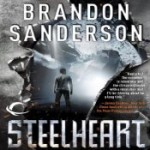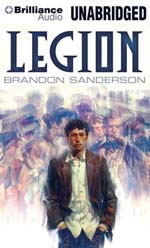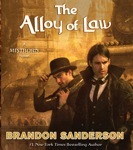
 Steelheart
Steelheart
By Brandon Sanderson; Read by Macleod Andrews
Audible Download – 12 Hours 14 Minutes [UNABRIDGED]
Publisher: Audible Frontiers
Published: 2013
Themes: / Dystopia / Apocalypse / Superheroes / Revenge
Brandon Sanderson, best-known for putting the finishing touches on Robert Jordan’s sprawling Wheel of Time series, has also crafted several fantasy epics of his own, including the Mistborn trilogy, Warbreaker, and the ambitious Stormlight Archive saga. Now, with Steelheart, he tries his hand at near-future dystopian fiction for young adults. Begin customary blurb. I don’t normally post the entire synopsis for a novel, but I feel this one encapsulates the themes and tone of the book rather neatly.
From the number-one New York Times best-selling author of the Mistborn Trilogy, Brandon Sanderson, comes the first book in a new, action-packed thrill ride of a series – Steelheart. Ten years ago, Calamity came. It was a burst in the sky that gave ordinary men and women extraordinary powers. The awed public started calling them Epics.
But Epics are no friend of man. With incredible gifts came the desire to rule. And to rule man you must crush his wills.
Nobody fights the Epics…nobody but the Reckoners. A shadowy group of ordinary humans, they spend their lives studying Epics, finding their weaknesses, and then assassinating them.And David wants in. He wants Steelheart – the Epic who is said to be invincible. The Epic who killed David’s father. For years, like the Reckoners, David’s been studying, and planning – and he has something they need. Not an object, but an experience.
He’s seen Steelheart bleed.
And he wants revenge.
How well does Sanderson make the transition from fantasy to science fiction? Unsurprisingly, spectacularly well. This is for several reasons. First, Sanderson is a professional writer par excellence. I may not like everything he writes, but I can’t deny that it’s all of the highest quality. Second, his elaborate, sometimes byzantine magic systems, with their complex rules, exceptions, and counter-exceptions, are more akin to science. To invert Arthur C. Clarke’s axiom, any sufficiently advanced magic is indistinguishable from technology. Likewise, Sanderson’s complex magic systems are distinguishable from the impressive technologies of Steelheart in name only. The novel’s villains, the superhuman Epics, would be at home in many of his worlds. Finally, Sanderson has experience writing for a younger audience, so he knows how to shape a story to the tastes of youth.
But don’t let the YA moniker fool you; Steelheart is a deeply emotional, nuanced, and grown-up book. Only its pared-down vocabulary, simple structure, and quick pacing belie its target audience. The stakes are high. I would compare the book’s overall feel to the last few Harry Potter books. Both feature a rag-tag group of misfits fighting against unimaginable power, impossible odds, and the darkest corners of human nature. Yes, the supervillainous Epics, like most supervillains, are a cipher for the worst human qualities: arroagance, anger, deception, and hate.Any young reader who thoughtfully finishes this book will be forced to confront very grown-up questions of right and wrong, friendship, loyalty, faith, and revenge. These themes might be more boldly drawn than they would be in a work for adults, but they’re not so boldly drawn as to stray into the dangerous realm of caricature or didactic.
I have only one minor but frequently recurring complaint about Steelheart. As a disciple of Robert Jordan, Sanderson likes to use elements from the world as curses and expletives. So, the characters are frequently heard to exclaim “Calamity!” after the red comet hovering in the sky. “Sparks!” is another oft-repeated expletive. In my view, Battlestar Galactica‘s “frak” is the only expletive to pull the effect off convincingly. In Sanderson’s works, as in Jordan’s, the device feels contrived, and jolts me right out of the narrative. The only thing that makes this offense remotely excusable is that the book is intended for the innocent eyes and ears of younger readers, but I still think Sanderson could have found a better way.
Macleod Andrews makes Steelheart a joy to listen to. He flows effortlessly from the youthful voice of protagonist David, to the gruff voice of the Prof, leader of the Reckoners, to the booming voice of Steelheart himself. Some audiobook connoisseurs might find his narration a tad melodramatic, but I can imagine younger readers reveling in Anderson’s adrenaline-fueled rendition of the action scenes. He also lends a light air of levity where it’s appropriate, counterbalancing the novel’s dark themes and bleak setting.
Steelheart is the first novel in a projected series, but Brandon Sanderson’s a busy guy with about a dozen anvil-sized irons in the fire at any given point in time. So I don’t know when a sequel will be forthcoming. While Steelheart neatly wraps up the main questions raised in the book’s early chapters, it still leaves plenty of room for exploration. What is Calamity? Was it really responsible for the rise of the Epics? What’s happening elsewhere in this wide, newly-devastated world. I can’t wait to find out.
Posted by Seth Wilson
 Legion
Legion







